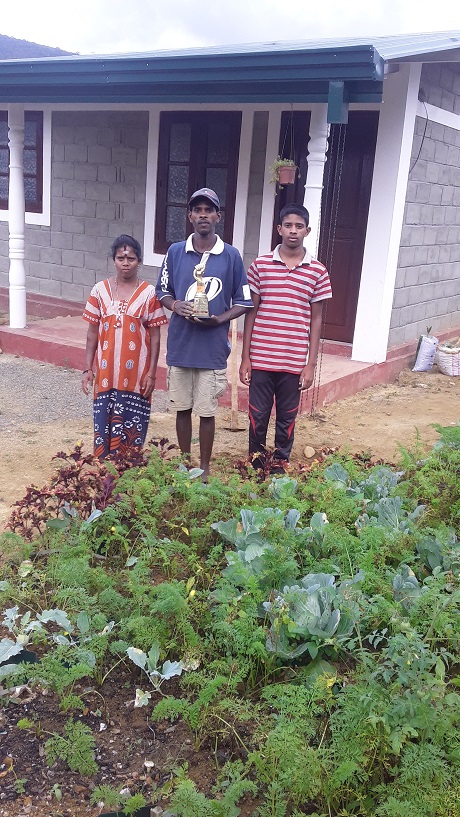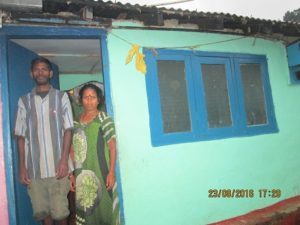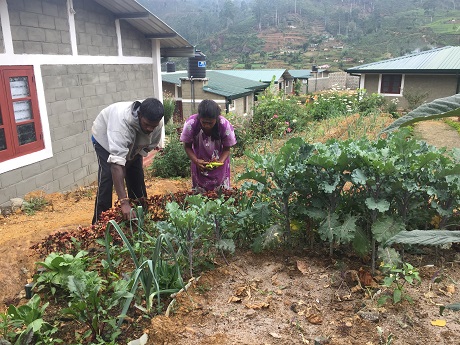Permanent Home for the Kalimuththu Family in Diyagama Estate, Nuwara Eliya
Indian Housing Project in Central and Uva Provinces
The Indian Housing Project in the Central and Uva Provinces (IHP-CUP) is a housing construction project for estate workers funded by the Government of India. UN-Habitat is implementing the project in Nuwara Eliya district in close collaboration with the Ministry of Hill Country New Villages, Infrastructure and Community Development, Regional Plantation Companies, Estate Worker Housing Cooperative Societies and communities in the area. During the first phase of the project, UN-Habitat is supporting the construction of 554 houses in two estates in Nuwara Eliya for estate worker families who are currently residing in dilapidated line rooms with minimal, basic facilities.
Mr. M.Kalimuththu has been employed at Diyagama West estate since 1992. He works from 7.30 a.m. to 1.30 p.m, for twenty days a month, earning approx. LKR. 7,500 per month. His main work responsibilities include clearing the tea estates of weeds as well as collecting plucked tea leaves from the fields in a tractor and unloading them at the factory. His wife Saraswathy has been working as a tea plucker in the same estate since 1997, earning LKR. 15,000 per month. The family live in a small line room at Diyagama West “First Division”. The line room is about 120 square feet with one bedroom. As there is no bathroom attached to the house, the family members share a common bathroom with neghbours in the adjoining line rooms. The couple and their two younger children live in the line room while their eldest daughter resides with her aunt in Nawalapitiya, where she is employed as a tailor.
When UN-Habitat commenced the IHP-CUP project at the Diyagama West estate, Mr.Kalimuththu was selected as a housing beneficiary. Agarapathana Plantation Ltd, in charge of managing the estate, has provided land to construct 150 houses for the estate workers. Kalimuththu’s house is being constructed on a seven perch block of land. Altogether, a total land area of 7.5 acres have been allocated at Diyagama estate to construct estate worker houses. UN-Habitat and Regional Plantation Companies have initiated the process to provide land titles to the beneficiaries through the Land Reform Commission.
The construction of the houses is undertaken through the Estate Worker Housing Cooperative Societies (EWHCS) in each plantation. The High Commission of India channels funds through the EWHCS who hire skilled construction workers, bulk purchase building materials and construct the houses. As the project is implemented through a participatory home owner driven process, estate worker families are also closely involved in planning and monitoring the housing construction. The families are also given the opportunity to provide their own labour and financial contributions towards the house construction.To construct each house, LKR.950,000 is provided in four instalments by the Indian High Commission. Having commenced construction activities in October 2016, Kalimuththu’s house was completed in December 2017.
UN-Habitat provided technical guidance including the preparation of house type plans, Bills of Quantities (BOQs) and technical supervision on the construction aspects including the selection of quality building materials. UN-Habitat had also provided basic construction training to beneficiary families including Kalimuththu so that they could assist in the construction activities. The Diyagama West Estate Workers Housing Cooperative Society is responsible for the construction work at Diyagama estate. During the construction period, Kalimuththu and the family provided their own labour support towards the construction. Their support included excavation of the foundations, backfilling and excavation of the toilet pit. Kalimuththu also supported the masons with unskilled construction work whenever time permitted. Kalimuththu’s new house is 550 square feet, consisting of a living room, two bedrooms, a kitchen, front verandah and an attached toilet. The house has been constructed using fair-faced cement blocks for walls. The roof has been constructed with zinc aluminium roofing sheets and galvanized C-Channels for the roof purlin. Door and window frames have been constructed with timber. The toilet has a twin pit latrine system, which can produce valuable fertilizer for home gardening. During his free time, Kalimuththu engages in small scale vegetable cultivation in rented land. Having followed training on organic vegetable cultivation provided by UN-Habitat, Kalimuththu has started organic vegetable cultivation in his garden cultivating leeks, Chinese cabbage, carrots, capsicums and beans. Rainwater collected from the roof is also used to water the garden. As a result of his impressive harvests from the home garden, Kalimuththu was selected as the best farmer in the Diyagama West region in a competition conducted by the Department of Agriculture. Due to the fragile nature of the hilly terrain in the central hills, disaster risk reduction measures have been incorporated into the house construction. These include deep column footings, step foundations, corner columns, external plinth beam, continuous lintel and roof anchoring. Disaster resilient landscaping features have been introduced in all settlements which include natural and structural slope stabilization elements with live fences erected around the houses. Geo-technical clearance of the National Building Research Organization (NBRO) has been obtained for all the sites. Some of the key challenges faced by the family during construction included inclement weather conditions and the shortage of skilled workers and construction material. During the initial period of construction, the construction of fair-faced block walls had taken additional time as the masons were not familiar with fair-faced technology.
The family is waiting for the electricity and water supply connections to be provided by the Government of Sri Lanka through the Plantation Human Development Trust (PHDT) in order to move into the new house. “We are eagerly waiting to move into our new house. We are looking forward to having more space and having our own washroom.” Mr. Kalimuththu said. The overall IHP-CUP project involves the construction of 4,000 houses and UN-Habitat is one of four implementing agencies of the project. The Indian Government is providing approximately US$30 million funding for the project. The 4,000 houses is a part of India’s overall commitment to fund the construction of 50,000 houses in conflict-effected and plantation regions of Sri Lanka.



